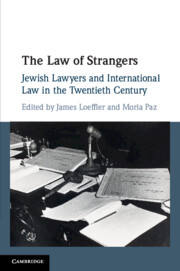Introduction
Published online by Cambridge University Press: 01 July 2019
Summary
We think of international lawyers as “a society of Brahmins,” Justice Robert Jackson told the American Society of International Law in an April 1945 lecture, “but it would be nearer the truth to say that it is a collection of pariahs.” Jackson’s suggestive comment came at a key juncture in the history of international law. Two weeks later, the United Nations Conference on International Organization opened in San Francisco, where the nations of the world gathered to negotiate a legal charter for a new post-war era of global community. The following month Jackson stepped down from his position on the U.S. Supreme Court to begin his tenure as the chief American prosecutor of the Nuremberg trials. Both events combined to form what he called “one of those infrequent occasions in history when convulsions have uprooted habit and tradition in a large part of the world and there exists not only opportunity, but necessity as well, to reshape … international law.”
- Type
- Chapter
- Information
- The Law of StrangersJewish Lawyers and International Law in the Twentieth Century, pp. 1 - 20Publisher: Cambridge University PressPrint publication year: 2019

